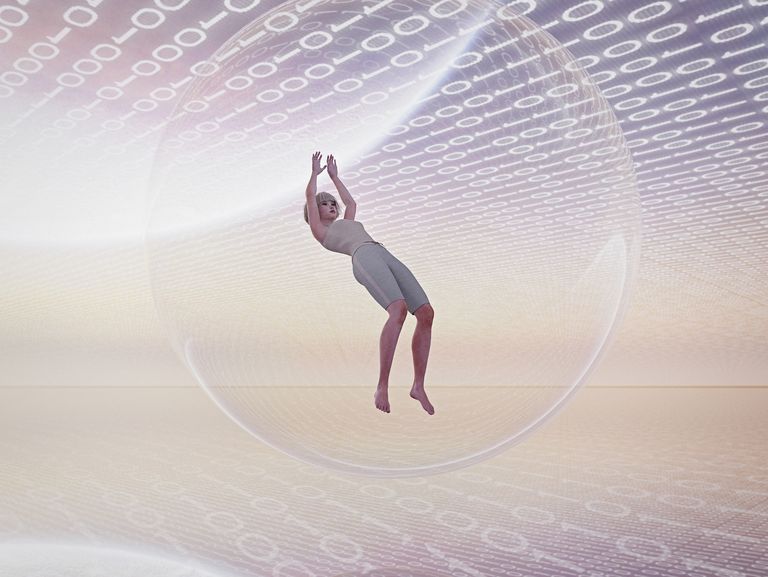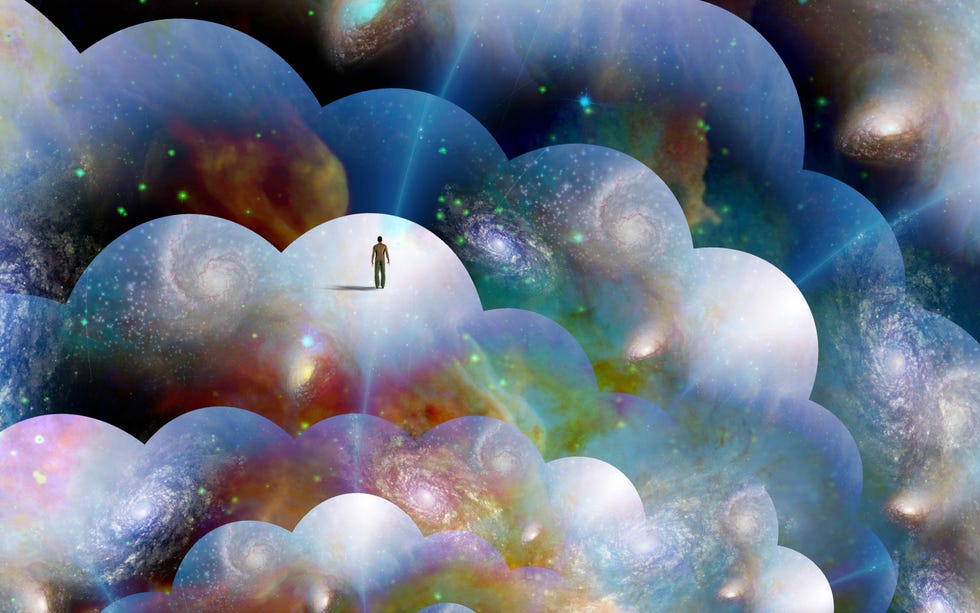SUSAN LAHEY
 Comedian John Mulaney once said, “I don’t know what my body is for other than taking my head from room to room.” He’s not alone. A lot of people equate their essential selves, their consciousness, with the thoughts in their head; “I think therefore I am.” Shows like Upload and films like Transcendence toy with the idea of achieving immortality by uploading one’s consciousness to a computer. In fact, this is part of a whole movement called “Transhumanism.”
Comedian John Mulaney once said, “I don’t know what my body is for other than taking my head from room to room.” He’s not alone. A lot of people equate their essential selves, their consciousness, with the thoughts in their head; “I think therefore I am.” Shows like Upload and films like Transcendence toy with the idea of achieving immortality by uploading one’s consciousness to a computer. In fact, this is part of a whole movement called “Transhumanism.”But physicist David Deutsch, often called “the father of quantum computing,” wants to take it a step further. He believes that one day we’ll be able to upload ourselves into quantum computers, which would allow us to see what other versions of ourselves are up to in other universes.
Today, quantum computers are too nascent for this. And nobody knows what consciousness really is. But as quantum computers and quantum biology progress, it might one day be possible.
Ideas about what it would be like if we could use computers as our “bodies” vary. In Amazon’s series, Upload, people’s brains are scanned and uploaded into an avatar body in one of several metaverse worlds: posh, resort metaverses exist for the rich, and meager post-death accommodations greet the poor. For a price, you can update your avatar and even “physically” interact with living folk if they wear haptic-feedback bodysuits that let them experience touch.
But author Louis Rosenberg, an engineer with a doctorate in philosophy, throws a wrench in this digital Valhalla. Rosenberg is an author, and CEO and chief scientist at Unanimous AI which creates artificial intelligence algorithms to capture collective intelligence. He points out that your uploaded self is really just a copy of you. Even if we manage to devise a machine capable of scanning someone’s entire brain—their memories, thoughts, and behaviors, down to the molecular level—and recreate it inside a computer, it wouldn’t actually prolong your experience of life.
“For an instant, that copy would be identical to you,” he tells Popular Mechanics. “And then the very next instant, as soon as it started having its own experiences … it’s going to diverge from you.”
“This computer copy would believe it had a body, and coping with its lack of a body might drive it mad.”
He poses this thought experiment: if one of these “magical brain scanners” was placed on a busy street where someone inadvertently passed under it, and it scanned their brain, would they transfer from their body to the computer? No.
“First of all, they would have no idea that they were scanned, right?” Rosenberg says. “They have no idea that a copy exists in a computer somewhere, so they wouldn’t suddenly feel like ‘Oh I got transported into a computer system.’ It wouldn’t be them. If you met that person on the street after they were scanned and said, ‘Hey we just scanned your brain, we’ve uploaded you into the cloud … you’re good, you can just walk into traffic right now and get run over by a car,’ they would say ‘No.’”
But now, he says, there would be a copy of you in a computer that truly believes it is you. It would have all of your memories; it would believe your family was its family, your job was its job, your money was its money—and it would believe it had the same rights as you. In essence, “you would have created this very difficult situation for yourself.”
Rosen, who recently published a graphic science fiction novel called Upgrade, also noted that this computer copy would believe it had a body, and coping with its lack of a body might drive it mad. In Upload, for instance, one character mentions that the first-generation avatars didn’t eat, poop, or blink, which drove them insane.
People who think their bodies are just meant to carry their heads around overlook the symbiosis between the two. We receive signals from our bodies constantly. The body is where a lot of our emotions register. It helps us know where we are, physically, in the world. Research shows that our gut bacteria genome, a part of our body we seldom think about, is key in who we are. It can be passed from generation to generation, like DNA, and can regulate gene expression. So a disembodied self in a computer would have a very different, quite possibly torturous, existence.
Many Copies, Many Universes
But what if we weren’t planning to spend eternity in the computer? What if, like Deutsch, we just wanted to travel the multiverse to see what our otherworldly counterparts were up to?
Deutsch, who wrote one of the initial papers in 1985 that proposed quantum computing, is a visiting professor, researcher, and author affiliated with Oxford University. He believes that quantum computing derives some of its computing power from other worlds. And while that sounds like an exotic theory, it’s partly based on something quite mundane: the fact that quantum processes use energy more efficiently than classical processes.
In the classical world, particles exist in specific, measurable places. But in the quantum world, particles exist in superposition—they could be anywhere and everywhere in a wave of probabilities—until they are observed. When they are observed, the wave function is said to “collapse,” leaving behind a specific particle that can be measured in a particular state.
Physicists still debate what the wave-function collapse means, how it works, or whether that’s even an accurate way to describe the phenomenon. But many experts now believe that when a particle is identified in one place and condition or state in our universe, it’s simultaneously locked in each of its remaining possible states in other universes. In other words, everything that can happen, does happen, in other universes. This is the Many Worlds Interpretation of quantum mechanics, which physicist Hugh Everett posed in 1957.

Getty Images
Classical computers operate like the classical world. They use bits—a one or a zero—to solve problems by testing options one at a time, albeit very fast. But instead of using bits, a quantum computer uses qubits, typically a subatomic particle like an electron or photon, that could be both one and zero and everything in between in a wave of probabilities. That is, quantum computers can test all of the answers almost at once.
One thing that helps them do so is the quantum property of entanglement. When particles that have previously been connected are entangled, even if they are very far apart, they can remain entangled such that if you know the state of one, you can instantly know the state of other particles with which it is entangled. For example, if you find one particle that has an upward spin, you know that a particle with which it is entangled will have a downward spin. Many particles can be entangled with one another, so a quantum computer that knows the state of one particle simultaneously knows the state of all the particles it’s entangled with, giving you exponentially more data per query. As a result of being able to test so many outcomes at once, quantum computers can solve problems much more quickly with the same amount of energy as classical computers.
In 1994, physicist Peter Shor presented an algorithm that showed that a problem a classic computer would take billions of years to solve—factorization of large prime numbers—could be completed in a few days by a quantum computer. Deutsch believes Shor’s algorithm is evidence that quantum computers are engaging with other universes.
In his book, The Fabric of Reality, Deutsch wrote:
“When Shor’s algorithm has factorized a number, using 10500 or so times the computational resources than can be seen to be present, where was the number factorized? There are only about 1080 atoms in the entire visible universe, an utterly minuscule number compared with 10500. So if the visible universe were the extent of physical reality, physical reality would not even remotely contain the resources required to factorize such a large number. Who did factorize it, then? How, and where, was the computation performed?”
Quantum computers, he believes, solve problems partly by engaging with quanta in other universes, and they retrieve the information and deliver it to this universe. The Many Worlds Interpretation says that people, not just particles, are also represented in all their possible states in the multiverse.
So once quantum computers become more robust, and once we find a way to upload our consciousnesses to them, we might find ourselves on a superhighway to our other selves. Or, at least, copies of us will.
No comments:
Post a Comment